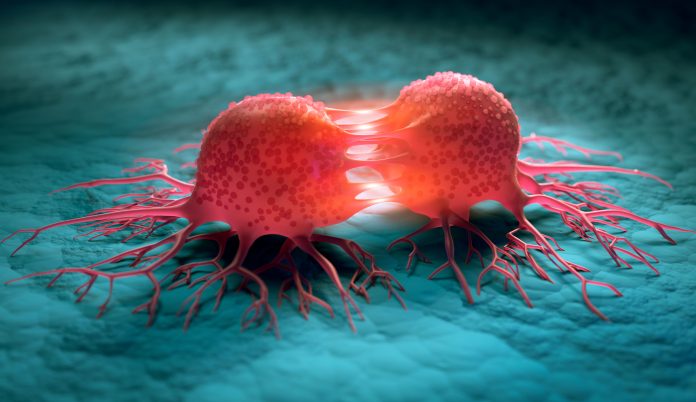
Ivosidenib, a drug used to treat a small proportion of cancers that carry a mutation in the IDH1 gene, may be much more widely applicable than previously thought, with potential activity against all types of cancer, suggests research published in Nature Cancer.
IDH1 encodes the isocitrate dehydrogenase 1 enzyme, which is “important to protect the cancer cell from stress and also to maximize energy production by the cancer cells when nutrients are really scarce,” Jordan Winter Division Chief of Surgical Oncology at University Hospitals Seidman Cancer Center in Cleveland, Ohio, told Inside Precision Medicine.
He explained: “Tumors have very low glucose and nutrient levels due to the poor blood supply. This creates two challenges: 1) it imposes massive oxidative stress on tumors since glucose is a prime resource for antioxidant defense systems in cancer cells; 2) the cancer cell struggles to generate all of the energy (ATP) it needs to power pro-survival pathways.”
IDH1 catalyzes a reaction that leads to optimal energy production when nutrients are limited. It is mutated in approximately 1% of cancers including gliomas, acute myelogenous leukemia, cholangiocarcinoma, and sarcomas.
Ivosidenib was developed to target the mutant IDH1 isoenzyme because “scientists correctly believed that if they could target the mutant enzyme and avoid inhibiting the wild-type enzyme in normal cells, then they would have a new drug with a large therapeutic window,” said Winter.
However, using experiments in pancreatic cancer cells, Winter and colleagues have now shown that the drug also inhibits wild-type IDH1, and thus cancer cell survival, but only when magnesium levels are lower than normally seen in serum, mimicking the tumor microenvironment.
The research also revealed that low glucose levels in tumor cells increase the relative importance of wild-type IDH1 for cancer cell survival whereas normal cells and tissues rely on the enzyme less.
This was apparent not only in cell culture experiments, but also in mouse tissues where the team observed minimal systemic toxicity during ivosidenib treatment.
Furthermore, when glucose levels were increased, neither genetic deletion nor pharmacologic inhibition of wild-type IDH1 affected pancreatic cancer cell viability, which the researchers say points to glycemic status as potential biomarker for anti-IDH1 therapy.
“Since most cell culture studies prior to our work were performed under conditions with high glucose and magnesium, we do not think it was largely appreciated that the drug was not as selective as previously thought,” Winter remarked.
His team has also tested ivosidenib in mouse models colorectal, ovarian and lung cancer, as well as melanoma. In each case, the anti-tumor effect of the drug was comparable or superior to previous studies with IDH1-mutated tumors. For example, median survival in a mouse pancreatic cancer model more than doubled with ivosidenib treatment.
In addition, other drugs developed as mutant-IDH1 inhibitors were also effective against tumors without the mutation.
Winter and team are now planning a clinical trial of ivosidenib in patients with pancreatic cancer and plan to enrol the first patient in the next 2 months. The high cost of the drug ($30,000/patient per month), however, will limit the number that can be accrued.
“We are hoping that the manufacturer ultimately sees the promise of this line of investigation and supports future studies, as further momentum grows through this work,” Winter remarked.
He concluded: “If additional pre-clinical work and especially clinical trial data prove that the drug is active against all cancers, then this would provide another weapon against cancer for 10’s of thousands of patients annually.”













